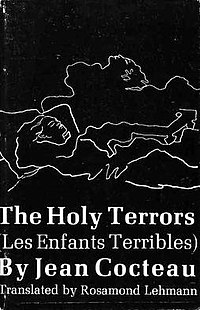
Jean Maurice Eugène Clément Cocteau was a French poet, playwright, novelist, designer, film director, visual artist and critic. He was one of the foremost artists of the surrealist, avant-garde, and Dadaist movements and an influential figure in early 20th century art. The National Observer suggested that, "of the artistic generation whose daring gave birth to Twentieth Century Art, Cocteau came closest to being a Renaissance man.".

Orpheus is a 1950 French film directed by Jean Cocteau and starring Jean Marais. It is the central part of Cocteau's Orphic Trilogy, which consists of The Blood of a Poet (1930), Orpheus (1950), and Testament of Orpheus (1960).

Jean-Alfred Villain-Marais, known professionally as Jean Marais, was a French actor, film director, theatre director, painter, sculptor, visual artist, writer and photographer. He performed in over 100 films and was the lover, muse and friend of acclaimed director Jean Cocteau. In 1996, he was awarded the French Legion of Honor for his contributions to French cinema.

Raymond Radiguet was a French novelist and poet whose two novels were noted for their explicit themes, and unique style and tone.

Juliette Gréco was a French singer and actress. Her best known songs are "Paris Canaille", "La Javanaise" and "Déshabillez-moi" (1967). She often sang tracks with lyrics written by French poets such as Jacques Prévert and Boris Vian, as well as singers like Jacques Brel and Charles Aznavour. Her 60-year career came to an end in 2015 when she began her last worldwide tour titled "Merci".
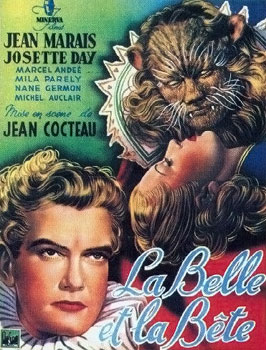
Beauty and the Beast is a 1946 French romantic fantasy film directed by French poet and filmmaker Jean Cocteau. Starring Josette Day as Belle and Jean Marais as the Beast, it is an adaptation of the 1757 story Beauty and the Beast, written by Jeanne-Marie Leprince de Beaumont and published as part of a fairy tale anthology.
Les Parents terribles is a 1938 French play written by Jean Cocteau. Despite initial problems with censorship, it was revived on the French stage several times after its original production, and in 1948 a film adaptation directed by Cocteau was released. English-language versions have been produced under various titles including Intimate Relations and Indiscretions.

Silvia Monfort was a French actress and theatre director. She was the daughter of the sculptor Charles-Maurice Favre-Bertin and the wife of Pierre Gruneberg. She was named a Knight of the Legion of Honour in 1973, an Officer of Arts and Letters in 1979 and Commander of Arts and Letters in 1983. She is buried in Père Lachaise Cemetery.
Nicole Stéphane was a French actress, producer and director.

Les Enfants terribles is a 1950 French film directed by Jean-Pierre Melville, with a screenplay adapted by Jean Cocteau from his 1929 novel of the same name about the tangled relationship of a close brother and sister.
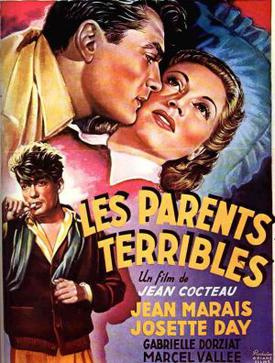
Les Parents terribles is a 1948 film adaptation directed by Jean Cocteau from his own stage play Les Parents terribles. Cocteau used the same cast who had appeared in a successful stage revival of the play in Paris in 1946. The film has sometimes been known by the English title The Storm Within.
The Holy Terror or Holy Terror may refer to:

The Holy Innocents (1988) is a novel by Gilbert Adair of three young cinephiles: two French siblings and an American stranger who enters their world. Its themes were inspired by Jean Cocteau's 1929 novel Les Enfants Terribles and by the 1950 film of the same name directed by Jean-Pierre Melville.
L'Aigle à deux têtes is a French play in three acts by Jean Cocteau, written in 1943 and first performed in 1946. It is known variously in English as The Eagle with Two Heads, The Eagle Has Two Heads, The Two-Headed Eagle, The Double-Headed Eagle, and Eagle Rampant. The title refers to the double-headed eagle of heraldry. Cocteau also directed a film of his play which appeared in 1948.
Les Enfants Terribles is a phrase in French that translates as "the terrible children" or "the holy terrors", and may refer to:
Francine Weisweiller was a Brazilian-born French socialite and patron of Yves Saint Laurent and Jean Cocteau.
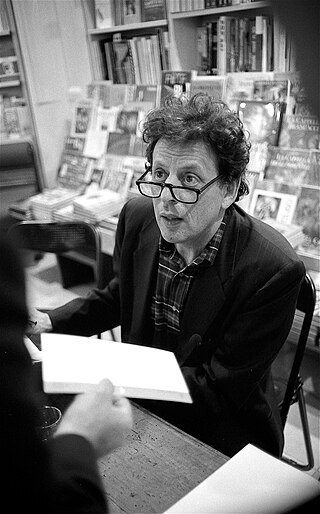
La Belle et la Bête is an opera for ensemble and film, composed in 1994 by Philip Glass based on a libretto in French by the composer according to the script of the film by Jean Cocteau released in 1946. This is the second part of a trilogy in homage to the French poet after Orphée (1993) and before Les Enfants terribles (1996). The world premiere of the work took place on 4 June 1994 in Seville, with Michael Riesman conducting.
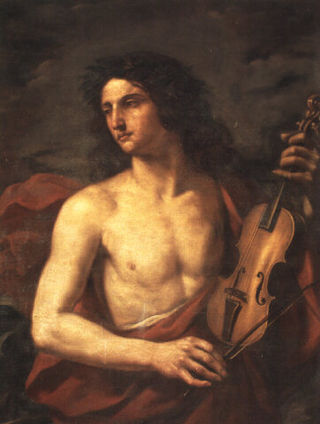
Orphée is a chamber opera in two acts and 18 scenes, for ensemble and soloists, composed in 1991 by Philip Glass, to a libretto by the composer, based on the scenario of the eponymous film (1950) by Jean Cocteau. Commissioned by the American Repertory Theater in Cambridge, Massachusetts, and the Brooklyn Academy of Music in New York, this is the first part of a trilogy in honour of the French poet. The world premiere of the work took place on 14 May 1993 under the direction of Martin Goldray and the European premiere in London on 27 May 2005 in the Royal Opera House's Linbury Studio Theatre.

Les Enfants terribles is a danced chamber opera for four voices and three pianos, composed in 1996 by Philip Glass, to a French-language libretto by the composer, in collaboration with the American choreographer Susan Marshall, after Jean Cocteau's eponymous novel published in 1929 and Jean-Pierre Melville's 1950 film. Commissioned by the "Steps" dance festival organized by the Pour-cent culturel Migros in several Swiss cities, this is the last part of a trilogy in homage to the French poet after Orphée (1993) and La Belle et la Bête (1994). The world premiere of the work took place on 18 May 1996 in Zug conducted by Karen Kamensek.
